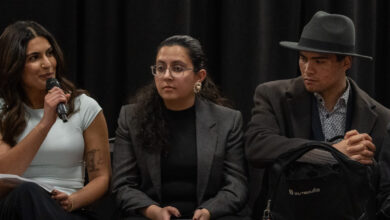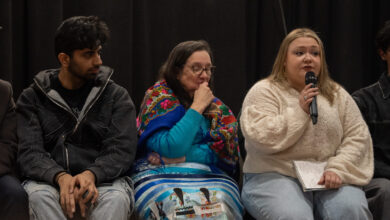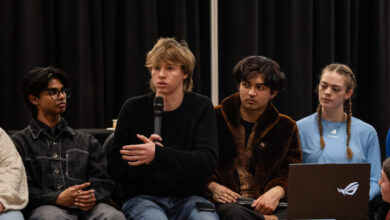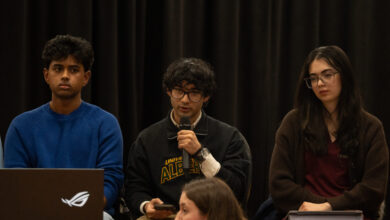Alternative history: A gay Donald Trump still would have won (and would have done better)
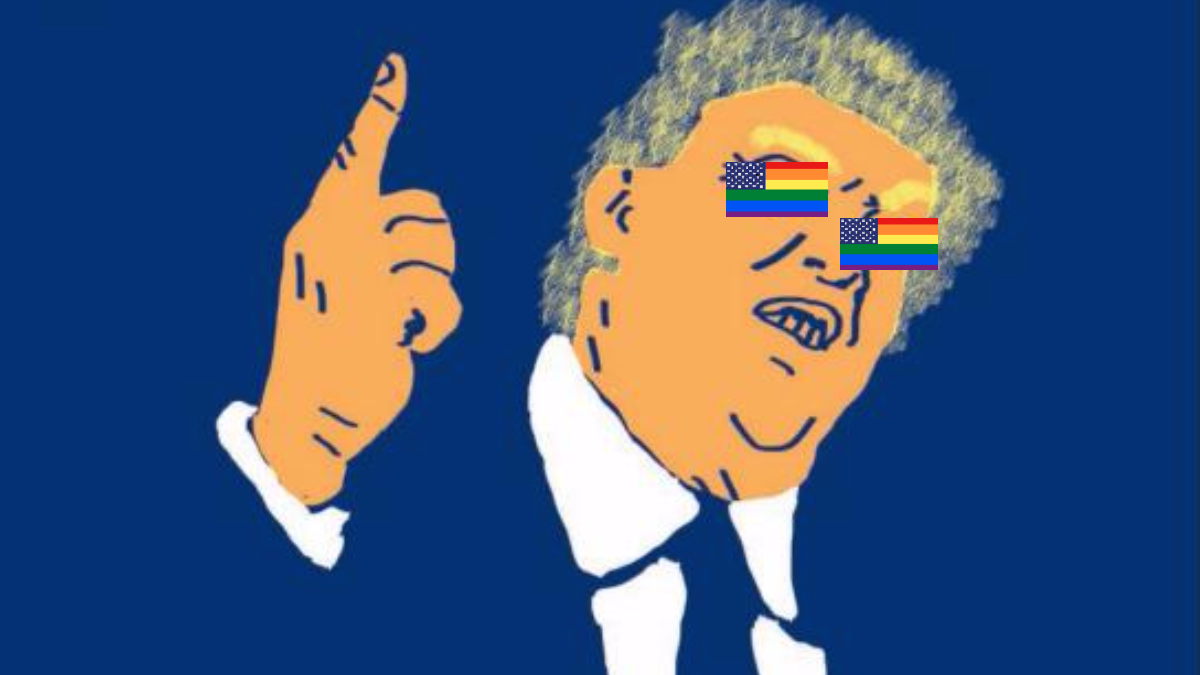 Mackenzie Leland
Mackenzie LelandIn 2016, LGBTQ+ advocacy in the United States faced a harsh backlash from the religious right. After securing nationwide marriage equality in 2015, the United States still had many queer issues open for debate, including discrimination related to housing, parenting, employment, and education. 2016 was also the year race issues took the spotlight, unconsciously consuming media more than queer issues. With a period of calm for LGBTQ+ advocates, 2016 could have been the year to elect a gay man to the highest office in America. This isn’t to speculate that President Donald Trump is in fact gay, but how the race would have been different were he an openly gay man, and how he would have won the election more decisively to become America’s first openly gay president.
The Background
Once marriage equality was legalized by the Supreme Court in 2015, many gay white men walked away from the fight for continuing equality. This could set the stage for a gay white man to run for, and win, the presidency. Donald Trump could still even run as a Republican, with the slowly-changing platform supported by those not on the Tea Party fringes. Gay Trump’s most likely path to the nomination requires him to be an asexual gay man without a partner who was previously married to a woman. He would still have had four of his five children, never marrying a third time after his divorce to Marla Maples in 1999. In fact, Trump could have come out in the late 1990s or early 2000s and not suffered a blow to his career, as many successful celebrities came out around the same time, including Ellen DeGeneres and Nathan Lane. Being an older, gay man who is not currently with a partner would be less offensive to Republican voters, and would have likely secured his nomination with all other factors staying the same. Being surrounded by Hollywood during this time would have also solidified a group of famous supporters and not had almost every celebrity who made a profit in 2016 endorse Democratic opponent Hillary Clinton. He also would have helped with the Republican defense against claims of discrimination because of their (very flawed) logic that an oppressed person cannot in turn be discriminatory.
The Campaign
Being the “diversity candidate,” Gay Trump would have earned the support of many gay rights advocates, despite his party’s hateful rhetoric — using the same defence of the top of the ticket being a minority. Milo Yiannopoulos, a gay conservative man who works for Breitbart News, supported Trump and rallied a fair number of gay white men behind him. Trump being gay would have energized gay white men and many more would have left Clinton for him, disregarding intersectionality and future human rights abuses. Under Gay Trump, gay white men would have been able to effectively silence the opposition of people of colour and transgender people, again citing their own oppression (though it is much more insignificant). Celebrities with a large gay fan base like Katy Perry, Cher, and Lady Gaga would have been less likely to openly criticize Gay Trump for his bigotry because of the potential harm to their careers. The “Trump Tapes” would have never happened if Gay Trump were out in the 2000s, but there is no indication he would be kinder to women because of the long history of misogyny in the gay male community. The one major change to Gay Trump’s campaign would be a different vice presidential running mate. Mike Pence has a long and unforgiving history of anti-gay rhetoric and action which would leave him ineligible to join Gay Trump’s ticket. Gay Trump would instead select someone who is mainstream Republican with an indifference to LGBTQ+ issues, like once-rumoured running mate finalist John Kasich. Kasich said that people should be required to sell goods and services to anyone regardless of sexuality, and that he once went to a gay friend’s wedding. He also believes in religious freedom, and would be the best VP candidate for balancing those two issues.
The Results
In this universe, Donald Trump won the presidency by securing 306 electoral college votes to Hillary Clinton’s 232. While I could not secure enough data to predict if Gay Trump would have won the popular vote, I estimate that he would have won the College by a wider margin of 314 to 216 to 6. Below is a chart of the states/districts that were won by less than a 3-percentage point margin on either side as well as Utah. This chart shows the seats in the Electoral College, when marriage quality was legalized in each state and by what means, and how the state voted in the last five elections:
| States | Vote Margin | College | Marriage Equality | Last 5 Elections |
| Maine-at-large | Dem +2.96 | 2 | 2012 – Vote | DDDDD |
| Minnesota | Dem +1.52 | 10 | 2013 – Bill | DDDDD |
| Nevada | Dem +2.42 | 6 | 2014 – Court | DDRRD |
| New Hampshire | Dem +0.37 | 4 | 2010 – Bill | DDDRD |
| Florida | GOP +1.20 | 29 | 2015 – Court | DDRRD |
| Michigan | GOP +0.23 | 16 | 2015 – SCOTUS | DDDDD |
| Nebraska 2nd District | GOP +2.24 | 1 | 2015 – SCOTUS | RRRRR |
| Pennsylvania | GOP +0.73 | 20 | 2014 – Court | DDDDD |
| Wisconsin | GOP +0.77 | 10 | 2014 – Court | DDDDD |
| Utah | GOP +17.9 | 6 | 2015 – SCOTUS | RRRRR |
Based on the results above, I predict that three states would have changed their votes enough to change the outcome under Gay Trump: Minnesota, New Hampshire, and Utah. Minnesota was only won by the Democrats by a margin of 1.52 per cent, and legalized marriage equality through a bill in 2013. New Hampshire was even slimmer with a 0.37 per cent margin and secured marriage equality even earlier, in 2010 through a bill. These two states are progressive enough and were close enough to voting Trump in this election that a more progressive Republican candidate would have tipped the scales. Utah is also considered because that state is the most coalesced for the Mormon vote, a staunchly anti-gay population. Independent candidate Evan McMullin gained 21 per cent of the vote to Clinton’s 21.6 per cent and I predict Gay Trump would have lost enough support to McMullin for him to win the state with a plurality of votes, becoming the first independent candidate to win seats in the Electoral College. Gay Trump would have gained 14 College votes from Clinton and lost 6 from McMullin, resulting in a 314-216-6 victory.
The Administration
A gay President Trump would symbolically signal unity, regardless of if that is what would occur through policy. Counsellor to the President, Kellyanne Conway would frame attacks against the president as being homophobic, in the same way her calls against dissent in this universe are unpatriotic. Gay Trump would have a significantly longer honeymoon period as well, where Executive Orders would be largely uncriticized as a nation searches for unity with a minority candidate forging a path forward. As the first openly gay president, Trump would enjoy a barrier from criticism based on his identity, but this would not reflect in his policies. Gay Trump would not provide a “gay asylum” clause to refugees, in the same way that transgender Americans would not be afforded additional protection. His policies would largely be the same, with a potential memorandum affirming marriage equality, but Gay Trump would still condemn business protection for transgender people, especially trans people of colour.
Gay Trump’s cabinet would be somewhat affected: Attorney General Jeff Sessions would not be chosen, as he has been given a zero per cent score by the Human Rights Commission for never voting in favour of a pro-LGBTQ bill. Ben Carson would not be chosen as Secretary of Housing and Urban Development because of his comments equating gay sex to bestiality and claiming that gay people have more rights than Christians in America. Betsy DeVos is a maybe, as her family has donated extensively to gay conversion therapy practices. Steve Bannon is also a maybe for his oversight of anti-gay news organization Breitbart, but I believe he would make the cut as his main appeal to Trump is racism. The rest of cabinet would remain as Trump chose them in this universe. In closing, a gay Donald Trump would have actually done better in the campaign, but would have been more dangerous as a false “diversity” candidate who would be afforded protection as a minority while he continued to attack human rights and the economy in the United States.

